- Home
- L. Ron Hubbard
Slaves of Sleep & the Masters of Sleep Page 2
Slaves of Sleep & the Masters of Sleep Read online
Page 2
And still the professor lingered on small-talk excuses. At last he ran out of conversation and stood merely fumbling with his hat. Jan scented trouble. He did not know just how or why, but he did.
“This is a very interesting room,” said the professor, at last. “Your people must have traveled the Seven Seas a great deal. But then they would have, of course.” He gave his hat a hard twist. “Take . . . er . . . take that copper jar, for instance. A very interesting piece of work. Ancient Arab also, I presume.”
Jan nodded.
“Might I be out of order to ask you where it came from?”
Jan had been remembering and he had the answer ready. And though he suddenly didn’t want to talk about that copper jar he heard himself doing so.
“My father’s cousin, Greg Palmer, brought it back from the Mediterranean a long time before I was born. He was always bringing things home.”
“Interesting,” said Frobish. “Must have been quite a fellow.”
“Everybody said he wasn’t much good,” said Jan. He added ruefully, “I am supposed to be like him, they say. He never held any job for long but they say he could have been a millionaire a lot of times if he had tried. But he claimed money made a man put his roots down. That’s one thing he never did. That’s his picture on the wall there.”
Frobish inspected it out of policy. “Ah, so? Well, well, I must say that he does look a great deal like you—that is, without your glasses, of course.”
“He—” Jan almost said, “He’s the only friend I ever had,” but he swiftly changed it. “He was very good to me.”
“Did—ah—did he ever say anything about that copper jar?” Frobish could hardly restrain his eagerness.
“Yes,” said Jan flatly. “He did. He said it was given to him by a French seiner on the Tunisian coast.”
“Is that all?”
“And when he left it here Aunt Ethel told him it was a heathen thing and that he had to put it in the attic. I used to go up and look at it sometimes and I was pretty curious about it.”
“How is that?”
“He made me promise never to open it.”
“What? I mean—is that so?” Frobish paced over to it and bent down as though examining it for the first time. “I see that you never did. The seal is still firmly in place.”
“I might have if Greg hadn’t been killed but . . .”
“Ah, yes, I understand. Sentiment.” He stood up and sighed. “Well! I must be going. That’s a very fine piece of work and I compliment you on your possession of it. Well, good day.” But still he didn’t leave. He stood with one hand on the doorknob, looking back at the jar as a bird will return the stare of a snake. “Ah . . . er . . . have you ever had any curiosity about what it might contain?”
“Of course,” said Jan, “but until now I had almost forgotten about it. Ten years ago it was all I could do to keep from looking in it.”
“Perhaps you thought about jewels?”
“No . . . not exactly.”
Suddenly they both knew what the other was thinking about. But before they could put it into words there came a sharp rap on the door.
Without waiting for answer, a very officious little man bustled in. He stared hard at Jan and paid no attention whatever to the professor.
“I called three times,” he complained.
“I was out on the Sound,” said Jan, uneasily.
“There are some papers which have to have your signature,” snapped the fellow, throwing a briefcase up on the blackwood desk and pulling the documents out. It was very plain that he resented having to seek Jan out at all.
Jan moved to the desk and picked up a pen. He knew that as general manager of the Bering Sea Steamship Corporation Nathaniel Green had his troubles. And perhaps he had a perfect right to be resentful, having spent all his life in the service of the late Palmer and then having not one share of stock left to him.
“If I could have your power of attorney I wouldn’t have to come all the way out here ten and twenty times a day!” said Green. “I have ten thousand things to do and not half time enough to do them in and yet I have to play messenger boy.”
“I’m sorry,” said Jan.
“You might at least come down to the office.”
Jan shuddered. He had tried that, only to have Green browbeat him before clerks and to have dozens and dozens of people foisted off on him for interview.
Green swept the papers back into the briefcase and bustled off without another word as though the entire world of shipping was waiting on his return.
Frobish’s face was flushed. He had hardly noticed the character of the interrupter. Now he came to the jar and stood with one hand on it.
“Mr. Palmer, for many years I have been keenly interested in things which . . . well, which are not exactly open to scientific speculation. It is barely possible that here, under my hand, I have a clue to a problem I have long examined—perhaps I have the answer itself. You do not censure my excitement?”
“You have researched demonology?”
“As connected with the ancient Egyptians and Arabs. I see that we understand each other perfectly. If this was found in waters off Tunisia, then it is barely possible that it is one of THE copper jars. You know about them?”
“A little.”
“Very few people know much about the jinn. They seem to have vanished from the face of the earth several centuries ago, though there is every reason to suppose that they existed in historical times. Sulayman is said to have converted most of the jinn tribes to the faith of Mohammed after a considerable war. Sulayman was an actual king and those battles are a part of his court record. This, Mr. Palmer, is not a cupid’s bow on this stopper but the Seal of Sulayman!” Frobish was growing very excited. “When several tribes refused to acknowledge Mohammed as the prophet, Sulayman had them thrown into copper jars such as this, stoppered with his seal, and thrown into the sea off the coast of Tunis!”
“I know,” said Jan, quietly.
“You knew? And yet . . . yet you did not investigate?”
“I gave my word that I would not open that jar.”
“Your word. But think, man, what a revelation this would be! Who knows but what this actually contains one of those luckless ifrits?”
Jan wandered back to his humidor and repacked his pipe. As far as he was concerned the interview was over. He might be bullied into anything but when it came to breaking his word . . . Carefully he lighted his pipe.
Frobish’s face was feverish. He was straining forward toward Jan, waiting for the acquiescence he felt certain must come. And when at last he found that his own enthusiasm had failed to kindle a return blaze, he threw out his hands in a despairing gesture and marched ahead, forcing Jan back against a chair into which he slumped. Frobish towered over him.
“You can’t be human!” cried Frobish. “Don’t you understand the importance of this? Have you no personal curiosity whatever? Are you made of wax that you can live for years in the company of a jar which might very well contain the final answer to the age-old question of demonology? For centuries men have maundered on the subject of witches and devils. Recently it became fashionable to deny their existence entirely and to answer all strange phenomena with ‘scientific facts,’ actually no more than bad excuses for learning. Men even deny telepathy in the face of all evidence. Once whole civilizations were willing to burn their citizens for witchcraft, but now the reference to devils and goblins brings forth only laughter. But down deep in our hearts, we know there is more than a fair possibility that such things exist. And here, man, you have a possible answer! If all historical records are correct, then that jar contains an ifrit. And if it does, think, man, what the jinn could tell us! According to history, they were versed in all the black arts. Today we know nothing of those things. All records died with their last possessors. Most of that knowledge was from hand to hand, father to son. What of the magic of ancient Egypt? What of the mysteries of the India of yesterday? What race in particular
was schooled in their usages? The jinn! And here we have one of the jinn, perhaps, entombed in this very room, waiting to express his gratitude upon being released. Do you think for a moment he would fail to give us anything we wanted in the knowledge of the black arts?”
The fragrant fog from his pipe drifted about Jan’s head and through it his glasses momentarily flashed. Then he sank back. “If I had not already thought this out, I would have no answer for you. There is no doubt but what the ifrit—if he is there—has died. Hundreds or thousands of years—”
“Toads have lived in stone longer than that!” cried Frobish. “And toads possess none of the secrets for which science is even now groping. A small matter of suspended animation should create no difficulty for such a being as an ifrit. You quibble. The point is this. You have here a thing for which I would sell my soul to see and you put me off. Since the first days in college when I first understood that there were more things in this Universe than could be answered by a slide rule and a badly conceived physical principle, I have dreamed of such a chance. I tell you, sir, I won’t be balked!”
Jan looked questioningly at Frobish. The fellow had suddenly assumed very terrifying proportions. And it was not that Jan distrusted his physical ability so much as his habitual retreat before the face of bullying which made him swallow now.
“I have given my word,” he said doggedly. “I know as well as you that that jar may well contain a demon from other ages. But for ten years I slaved to forget it and put it out of my mind forever. And I do not intend to do otherwise now. The only friend I ever had gave me that jar. And now, with Greg Palmer dead in the deep of nine south and fifty-one east, I have no recourse but to keep the promise I gave him. He was at pains to make me understand that I would do myself great harm by breaking that seal and so I have a double reason to refuse. I could let nothing happen to you in this . . .”
“My safety is my own responsibility. If you are afraid . . .”
Jan, carried on by the dogged persistence of which he was occasionally capable—though nearly always against other things than man—looked at the floor between his feet and said, “I can say with truth that I am not afraid. I am not master of my own house nor of my slightest possessions; I may be a feather in the hands of others. But there is one thing which I cannot do. I do not want to speak about it any further.”
Frobish, finding resistance where he had not thought it possible, backed off, studying the thin, not unhandsome face of his host as though he could find a break in the defenses. But although Jan Palmer wore an expression very close to apology, there was still a set to his jaw which forbade attack. Frobish gave a despairing look at the jar.
“All my life,” he said, “I have searched for such a thing. And now I find it here. Here, under the touch of my hands, ready to be opened with the most indifferent methods! And in that jar there lies the answer to all my speculations. But you balk me. You barricade the road to truth with a promise given to a dead man. You barricade all my endeavors. From here on I shall never be able to think of anything else but that jar.” His voice dropped to a pleading tone. “In all the records of old there are constant references to ifrits, to marids and ghouls. We have closed our eyes to such things. It is possible that they still exist and it would only be necessary to discover how to find them. And there is the way to discover them, there in that corner. Can’t you see, Mr. Palmer, that I am pleading with you out of the bottom of my heart? Can’t you understand what this means to me? You . . . you are rich. You have everything you require. . . .”
“I have nothing. In all things I am a pauper. But in one thing I can hold my own. I cannot and will not break my word. I am sorry. Had you argued so eloquently for this very house you might have had it because this house is a yoke to me. But you have asked for a thing which it is beyond my power to give. I can say nothing more. Please do not come back.”
It was a great deal for Jan Palmer to say. Green and Thompson and Aunt Ethel would have been rocked to their very insteps at such a firm stand had they witnessed it. But Jan Palmer had not been under the thumb of Frobish from the days of his childhood. This concerned nothing but the most private possession a man can have—his honor. And so it was that Frobish ultimately backed out of the door, too agitated even to remember to take the Arabian dhow.
Before Jan closed off the entrance, Frobish had one last glimpse of the copper jar, dull green in the light of the sinking sun. He clamped his mouth shut with a click which sounded like a bear trap’s springing. He jerked his hat down over his brow. Swiftly he walked away, looking not at all like a fellow who has become reconciled to defeat.
Jan had not missed the attitude. He had lived too long in the wrong not to know the reactions of men. He had seen his mother hounded to death by relatives. He had felt the resentment toward wealth, really meant for his father. He had been through a torturous school and had come out far from unscathed. He knew very definitely that he would see Frobish again. Wearily he closed his door and slumped down in a chair to think.
Chapter Two
Jinni Gratitude
Each evening, when the household was assembled at the dining table, Jan Palmer had the feeling that the entire table’s attention was devoted to seeing whether or not he would choke on his next mouthful. As long as his father had been alive, this had been the one period of the day when he had been certain of himself. His father had occupied the big chair at the head, filling it amply, and treating one and all to a rough jocosity which was very acceptable—until his father had retired to his study for the night. Then it seemed that his rough jests were not at all lightly received. Quite obvious it had been that fawning was a wearying business at best and that those so engaged were apt to revert at the slightest excuse.
Jan didn’t come close to filling the big chair. His slight body could have gone three times between the arms of it. And Aunt Ethel and Thompson, and occasionally, as tonight, Nathaniel Green, found no reason whatever to do any fawning.
Having very early deserted the bosom of his family for the flinty chest of Socrates, Jan knew quite well that if he had had the dispensing of funds comparable to those of his father in his entire control, smiles and not scowls would now be his lot. But the Bering Sea Steamship Corporation was not showing much of a profit. Just why he did not know. He had never peeped into the books but he supposed that these continual strikes had something to do with it. The company paid Thompson and most of Jan’s lot went directly to Aunt Ethel for household expenses. He had, therefore, no spare dollars to spread around.
The deep, dank silence was marred only by the scraping of silver on china. It was as if they all had secrets which they were fearful of giving away to each other or as if they could say nothing but things so awful that they wouldn’t even let Jan hear them. The old house, with its ship models on the mantel and the great timbers across the ceilings and the hurricane lanthorns hung along the walls, wouldn’t have been much louder had it had no occupants at all.
Jan was glad when the gloomy footman put indifferent coffee before them. If he was careful he could gulp it down and get away without a thing being said to him.
But his luck didn’t hold. “Jan,” said Nathaniel heavily, “I trust you will be home this evening.” The question implied that Jan was never to be found at home but always in some dive somewhere, roistering.
“Yes,” said Jan.
“You saw fit to leave today when I needed your signature. When I finally connected with you, I had only time to get the most urgent matters attended to. You are too careless of these serious matters. There are at least twenty letters which only you can write, unfortunately. I am forced to demand that you finish them tonight. If I but had your complete power of attorney you would save me much needless labor. I have so many things to do already that if I were six men with twelve hands I couldn’t get them done in time.”
Strangely enough it came as welcome news to Jan. He almost smiled. “I am sorry I can’t be of more help but I’ll be glad to do the letters t
onight.”
Nathaniel grunted as much as to say that Jan better had if he knew what was good for him. And Jan took the grunt as a cue for his departure. Swiftly he made his way to his apartments, fearful that this wouldn’t come out the way he hoped it would.
The first thing he did was strip off his clothes and duck under a shower. He came forth in an agony of haste, losing everything and finding it and losing it again as he swiftly assembled himself. His wardrobe was able to offer very little as Aunt Ethel purchased most of his clothing and did little purchasing. But the dark blue suit was neatly pressed and his cravat was nicely tied and he had no more than finished slicking back his blond hair when a knock sounded.
Hurriedly he flung himself into his chair by the desk and scooped up a book. Then he called, “Come in,” as indifferently as he could.
Alice Hall stepped firmly into the room. As Nathaniel’s stenographer it was her duty, two or three times a week, to call in the evening to let Jan catch up on company correspondence. She was the last of six such stenographers and ever since she had first taken the job four months before, Jan had lain awake nights trying to figure out a way to make certain that she would hold her job. It was not so much that she was beautiful—though she was that—and it wasn’t entirely because she was the only one who did not seem to look down upon him. Jan had tried to turn up the answer in vain. She was a lady, there was no denying it, and she was far better educated than most stenographers, evidently having done postgraduate work. She did not make him feel at ease at all but neither did she make him feel uneasy. When he had first beheld her he had had a hard time breathing.
Her large blue eyes were as impersonal as the turquoise orbs of the idol by the wall. She was interested, it seemed, in nothing but doing her immediate job. Still, there was something about her; something unseen but felt, as the traveler can sense the violence of a slumbering volcano under his feet. Her age was near Jan’s own and she had arrived at that estate without leaving anything unlearned behind her. There was almost something resentful about her, but that too was never displayed.

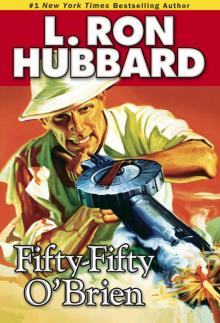 Fifty-Fifty O'Brien
Fifty-Fifty O'Brien Villainy Victorious
Villainy Victorious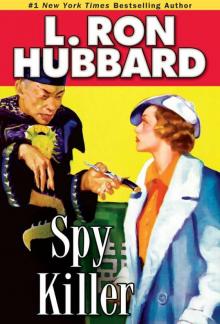 Spy Killer
Spy Killer Ai! Pedrito!: When Intelligence Goes Wrong
Ai! Pedrito!: When Intelligence Goes Wrong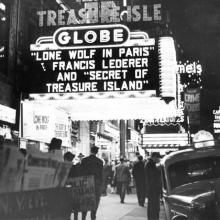 The Dangerous Dimension
The Dangerous Dimension Mission Earth Volume 1: The Invaders Plan
Mission Earth Volume 1: The Invaders Plan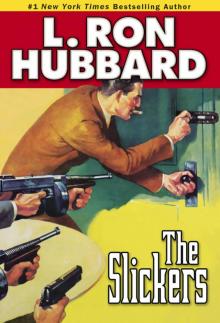 The Slickers
The Slickers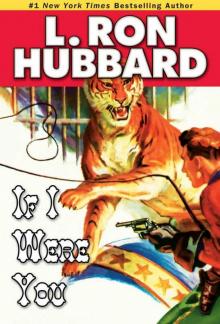 If I Were You
If I Were You The Doomed Planet
The Doomed Planet Writers of the Future Volume 31
Writers of the Future Volume 31 Mission Earth Volume 2: Black Genesis
Mission Earth Volume 2: Black Genesis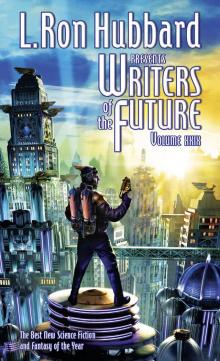 Writers of the Future: 29
Writers of the Future: 29 Death Quest
Death Quest The Enemy Within
The Enemy Within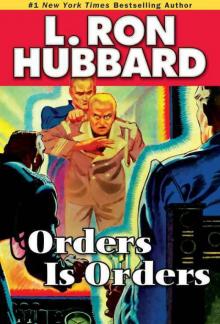 Orders Is Orders
Orders Is Orders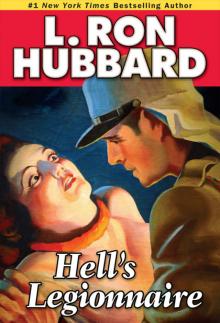 Hell's Legionnaire
Hell's Legionnaire L. Ron Hubbard Presents Writers of the Future 34
L. Ron Hubbard Presents Writers of the Future 34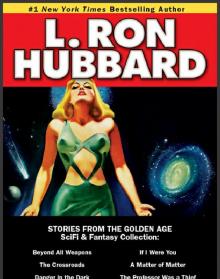 The Scifi & Fantasy Collection
The Scifi & Fantasy Collection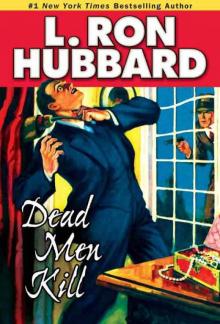 Dead Men Kill
Dead Men Kill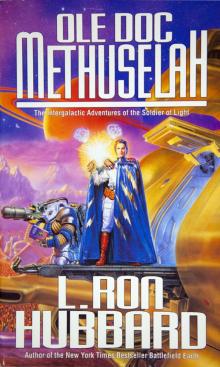 Ole Doc Methuselah: The Intergalactic Adventures of the Soldier of Light
Ole Doc Methuselah: The Intergalactic Adventures of the Soldier of Light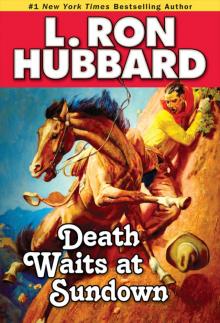 Shadows From Boot Hill
Shadows From Boot Hill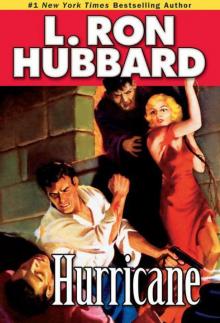 Hurricane
Hurricane Mission Earth Volume 3: The Enemy Within
Mission Earth Volume 3: The Enemy Within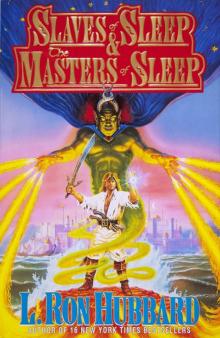 Slaves of Sleep & the Masters of Sleep
Slaves of Sleep & the Masters of Sleep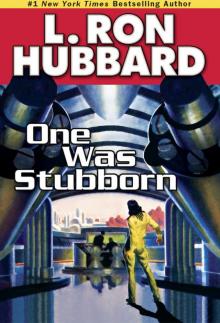 One Was Stubborn
One Was Stubborn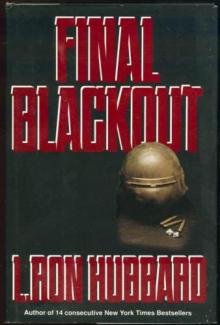 Final Blackout: A Futuristic War Novel
Final Blackout: A Futuristic War Novel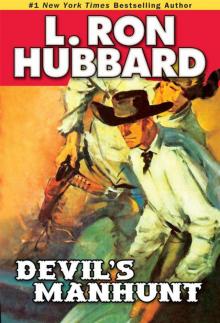 Devil's Manhunt
Devil's Manhunt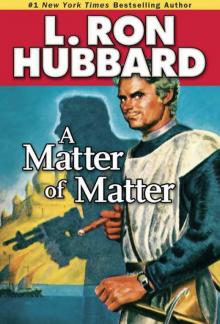 A Matter of Matter
A Matter of Matter Voyage of Vengeance
Voyage of Vengeance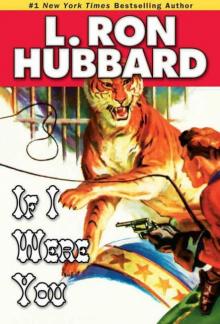 If I Were You (Science Fiction & Fantasy Short Stories Collection)
If I Were You (Science Fiction & Fantasy Short Stories Collection)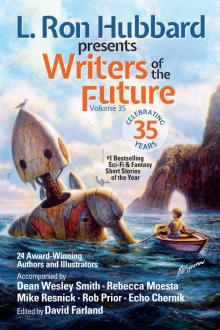 L. Ron Hubbard Presents Writers of the Future Volume 35
L. Ron Hubbard Presents Writers of the Future Volume 35 Mission Earth Volume 4: An Alien Affair
Mission Earth Volume 4: An Alien Affair Black Genesis
Black Genesis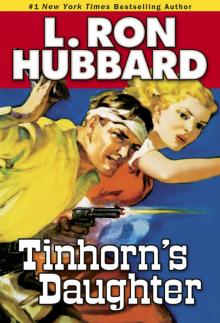 Tinhorn's Daughter
Tinhorn's Daughter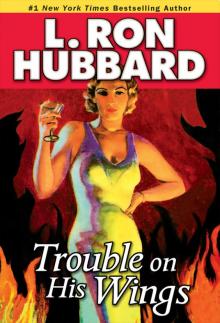 Trouble on His Wings
Trouble on His Wings Writers of the Future Volume 27: The Best New Science Fiction and Fantasy of the Year
Writers of the Future Volume 27: The Best New Science Fiction and Fantasy of the Year Writers of the Future Volume 28: The Best New Science Fiction and Fantasy of the Year
Writers of the Future Volume 28: The Best New Science Fiction and Fantasy of the Year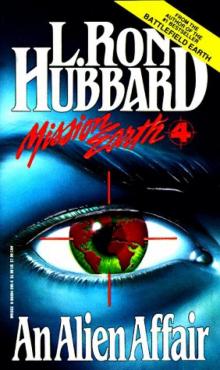 An Alien Affair
An Alien Affair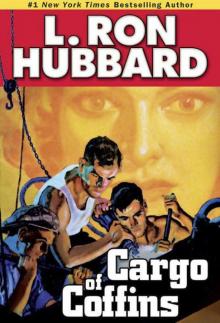 Cargo of Coffins
Cargo of Coffins Mission Earth Volume 5: Fortune of Fear
Mission Earth Volume 5: Fortune of Fear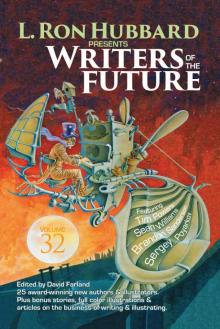 Writers of the Future 32 Science Fiction & Fantasy Anthology
Writers of the Future 32 Science Fiction & Fantasy Anthology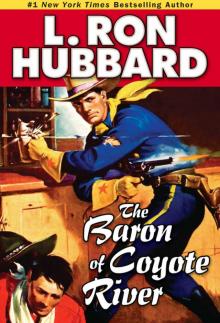 The Baron of Coyote River
The Baron of Coyote River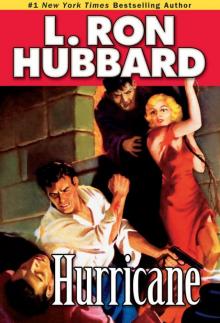 Hurricane (Stories From the Golden Age)
Hurricane (Stories From the Golden Age)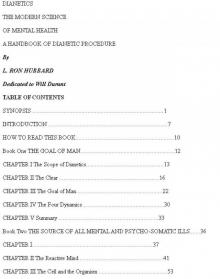 Dianetics: The Modern Science of Mental Health
Dianetics: The Modern Science of Mental Health Writers of the Future, Volume 30
Writers of the Future, Volume 30 Battlefield Earth: A Saga of the Year 3000
Battlefield Earth: A Saga of the Year 3000 Fear
Fear Disaster
Disaster Invaders Plan, The: Mission Earth Volume 1
Invaders Plan, The: Mission Earth Volume 1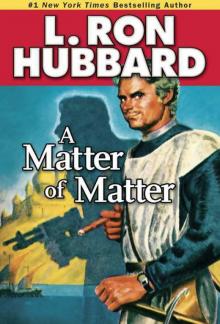 A Matter of Matter (Stories from the Golden Age)
A Matter of Matter (Stories from the Golden Age) Writers of the Future Volume 34
Writers of the Future Volume 34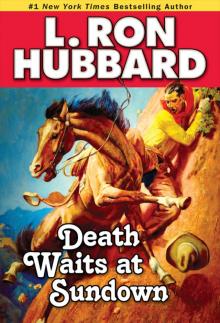 Death Waits at Sundown
Death Waits at Sundown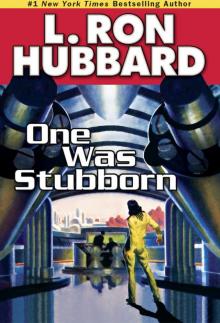 One Was Stubbron
One Was Stubbron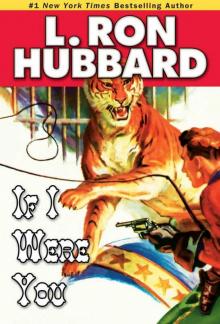 If I Were You (Stories from the Golden Age)
If I Were You (Stories from the Golden Age)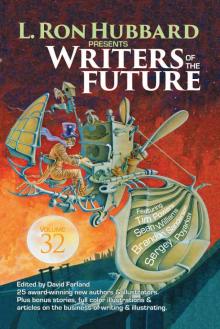 Writers of the Future 32 Science Fiction & Fantasy Anthology (L. Ron Hubbard Presents Writers of the Future)
Writers of the Future 32 Science Fiction & Fantasy Anthology (L. Ron Hubbard Presents Writers of the Future)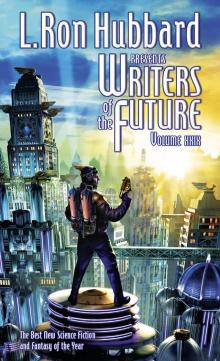 Writers of the Future, Volume 29
Writers of the Future, Volume 29 Mission Earth Volume 8: Disaster
Mission Earth Volume 8: Disaster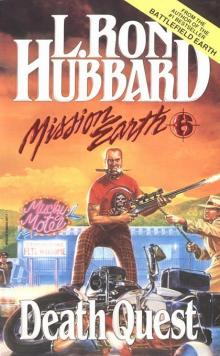 Mission Earth 6: Death Quest
Mission Earth 6: Death Quest Writers of the Future, Volume 27
Writers of the Future, Volume 27 Mission Earth Volume 7: Voyage of Vengeance
Mission Earth Volume 7: Voyage of Vengeance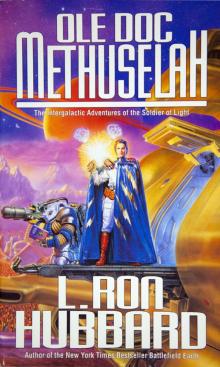 Ole Doc Methuselah
Ole Doc Methuselah Mission Earth 07: Voyage of Vengeance
Mission Earth 07: Voyage of Vengeance Battlefield Earth
Battlefield Earth Fortune of Fear
Fortune of Fear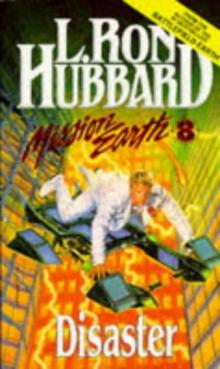 Mission Earth 8: Disaster
Mission Earth 8: Disaster Mission Earth Volume 10: The Doomed Planet
Mission Earth Volume 10: The Doomed Planet Writers of the Future, Volume 28
Writers of the Future, Volume 28 Mission Earth Volume 6: Death Quest
Mission Earth Volume 6: Death Quest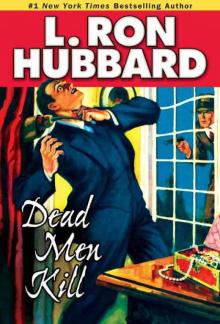 Dead Men Kill (Stories from the Golden Age)
Dead Men Kill (Stories from the Golden Age)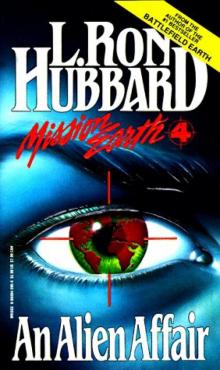 Mission Earth 4: An Alien Affair
Mission Earth 4: An Alien Affair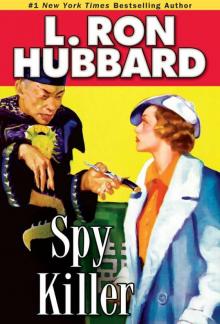 Spy Killer (Stories from the Golden Age)
Spy Killer (Stories from the Golden Age) Mission Earth Volume 9: Villainy Victorious
Mission Earth Volume 9: Villainy Victorious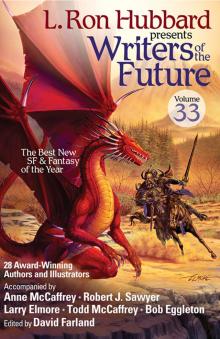 L. Ron Hubbard Presents Writers of the Future, Volume 33
L. Ron Hubbard Presents Writers of the Future, Volume 33